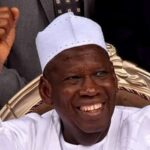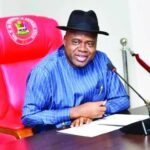By Felix Khanoba
The Centre for Democracy and Development (CDD) as lashed out at the desperate and democratic approaches adopted by political parties during the November 11 governorship elections in Kogi, Bayelsa and Imo states.
Addressing newsmen on Monday in Abuja on the conduct and outcome of the off-cycle elections, Chairman of CDD Election Analysis Centre (CDD-EAC), Professor Adele Jinadu, said the affected political parties are behaving in a way capable of destroying the nation’s electoral process.
Jinadu, who lamented that many politicians have perfected various antics to outsmart innovations introduced in the electoral process, said there is urgent need to reform political parties in the country.
Also, the CDD-EAC in a text of press statement read by one of its members, Mrs Mufiliat Fijabi, expressed concerns over the politics of identity, abuse of incumbency power, among others, that characterised the highly contested elections.
It reads in full :”The CDD Election Analysis Centre (CDD-EAC) is pleased to welcome ladies and gentlemen of the press to this final press briefing by the EAC on its key findings on the conduct of the November 11, 2023 off-cycle elections in Bayelsa State, Imo State and Kogi State. What follows is a summary of the key findings. The EAC will publish its final report on the conduct and outcome of the elections on the CDD website later today. The statement is set in the broader context of the economic, political and sociocultural environment, which not only frames but continues to pose challenges for the country’s competitive party and electoral politics. Major features of this environment are the following: – Incumbency, Identity, Institutions, Inducement, Information Disorder. These features, have in recent years, progressively constituted more disturbingly than before and fetters on the country’s electoral democracy, despite limited success in sanitizing the country’s electoral process.
Based on its findings, the EAC’s major message is the following: there is a need to separate the unpredictable technical failures that are due to the operational, logistical and infrastructure challenges of electoral administration in the country on the one hand from the politically instigated failures attributable in the main to deliberate manipulation by candidates, political parties and their proxies in state and society on the other hand. The challenge, therefore, is how to unscramble the nexus connecting technical to politically motivated failures with a view to enhancing the integrity of elections in the country.
In what follows we summarize our major findings on the five features framing the environment of democratic politics in the country.
II: INCUMBENCY
The abuse of the power of incumbency for unfair partisan party-political electoral advantage by the governing parties in the three states is a major factor posing challenge to the conduct of election in the country. The abuse of incumbency takes any or all of the following forms – unequal access of opposition parties to state electronic media, the deployment of state resources, such as official state vehicles and staff for electioneering campaigns and the mobilization of voting banks by parties in power in the three states, and the denial of the display of bill boards, the denial of access to campaign facilities and public spaces by opposition parties to convey their messages to the electoral by signage authorities. These remain major fetters on the conduct of the three off-cycle elections that satisfied the conditions for electoral integrity.
But the abuse of the power of incumbency was also deployed to distort the party primary process of the governing parties in two of the three states—Bayelsa and Imo—where the incumbent Governors sought re-election for a final second term; and in the third state—Kogi—where the incumbent Governor, unable to seek re-election because he was serving out his final non-renewable second-term used the full panoply of state power and resources to ensure the victory of his preferred candidate during the ruling party’s primary elections.
The impact of the abuse of the power of incumbency, so illustrated, created an unfair level playing ground that gravely diminished the credibility of the off-cycle elections in the three states.
III: IDENTITY
The politics of Identity featured in the off-cycle elections in the three states in the nomination process for the governorship candidates of the political parties. Identity as a factor in the elections assumed different forms. In one sense Identity assumed the form of the ethnic configuration in the three states.
In Kogi State, for example, while the retiring incumbent governor ensured not only that the ruling party nominated a candidate from his ethnic group in the state, the other major parties chose candidates from other ethnic groups, hoping to cash in on the claim that the next governor must come from their own ethnic groups.
Another form identity played out was as geographical or zonal Identity. In Bayelsa State, for example, the APC campaigned on the claim that the Eastern Zone of the State should produce the next Governor. In Imo State, the PDP based its campaign on the Governorship returning to the Owerri Zone, on equity grounds, while LP staked a claim for the Okigwe Zone. This particular form of identity politics as geographical identity or zoning draws on the federal character clauses of Nigeria’s 1999 Constitution. Another version of the identity politics is the gender consideration that influenced the choice of female deputy governorship candidates by the APC candidate for Governor in Imo State and PDP in Kogi States.
The challenge of identity politics when it is used to mobilise political support is the tendency for it to descend into ethnic profiling, ethnic hate speech and the tendency for the political mobilisation of ethnicity to descend into violent ethnopolitical conflict.
IV: INDUCEMENT
Inducement of voters, especially in the form of vote-buying and vote-selling, featured during the 11 November, 2023 off-cycle elections.
Our observers reported incidents of inducement of voters in (a) Bayelsa State, where in some polling units in the Southern Ijaw LGA, wrappers and rice were allegedly distributed to voters in addition to monetary inducements, (b) Imo State, where party agents allegedly offered voters cash incentives and, more worryingly, where INEC ad-hoc staff allegedly received money from party agents in PU 7, Ehime-Mbano LGA; and (c) Kogi State, where the LGA Chairman of Igalamela-Odudu was arrested with wads of cash and bullets on his person.
V: INFORMATION DISORDER
Reported cases of the spread of disinformation during off-cycle elections in the three states included the false news that the governorship candidate of the PDP in Imo State, Sam Anyanwu had voluntarily withdrawn from the elections, and that the SDP governorship candidate in Kogi State, Murtala Ajaka, had been disqualified from contesting the elections.
VI: INSECURITY
The elections in the three states were conducted against a history of political conflict occasioned by cultism, insurgencies and separatist agitations. Against this background, the prospects of insecurity were a major source of concern before and during the elections. The elections witnessed the following incidents of violence: (a) an alleged ballot snatcher being shot and killed in Dekina LGA in Kogi State;(b) another person was shot dead in Famgbe Community in Yenegoa LGA, Bayelsa; and (c) a violent altercation in a collation centre in Kogi State, where a group of other party agents pounced upon and violently attacked another party agent who was complaining about the conduct of elections in the state.
VII: INSTITUTIONS
Key institutions that played an important role in the conduct and outcome of the elections were INEC, the security agencies, the state executive branch of government, the judiciary, the political parties and the media.
Despite its preparations for the elections, INEC experienced (a)delays in the timely commencement of elections in the three states; (b) malfunctioning in the use of BVAS for accreditation; (c) problem with the pre-filled election result sheets in Ogori Magongo LGA in Kogi and the upload of wrong or undeclared results on the IRev, also in some polling units in Kogi State. Although these glitches may not have been widespread or deliberate, they remain concerns which INEC needs to seriously find solutions to.
The Security Agencies appear to have secured the electoral process on election day.
The role of political parties remains a major cog in the conduct of free and fair elections in the country. Their failure to manage inter-party and intra-party disputes amicably and democratically is a major factor that generates violent electoral conflict with ripple effect on the politically generated failures of the electoral process referred to in the introduction to this statement. It nurtures and sustains the general impunity that now characterizes and defines electoral and voting behaviour in the country. It remains the gravest threat to electoral democracy in the country, as exemplified in the impunity that drives the gross abuse of the power of incumbency for partisan party-political electoral advantage, including the erosion of the independence of such democratic promoting institutions as the EFCC, the ICPC, and the separation of powers between the executive, legislature and judiciary.
VIII: CONCLUSION
The upshot of EAC’s observations on the central role of institutions in the broader context of the electoral history of Nigeria since 1999, which the conduct and outcome of the off-cycle elections in Bayelsa, Kogi and Imo States more or less mirror, is to focus more seriously on the urgent need to reform our political parties in ways that will see them play a more responsible role as the sentinel not a problem for electoral democracy in our country. “



